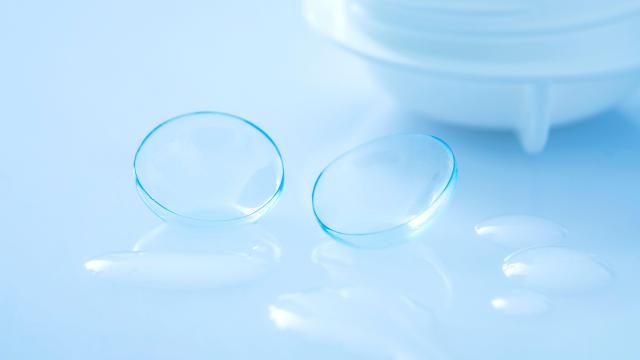The future of eye care looks poised to involve specialised contact lenses filled with medicine. The Food and Drug Administration has approved a new type of contact that releases an antihistamine to help prevent itchy eyes from allergies for up to 12 hours. Similar treatments for other eye diseases may be on the way soon.
The antihistamine is called ketotifen, and it’s been in use since the 1970s. Ketotifen is a common treatment for itchy eyes caused by allergy, but up until now it’s been given through eye drops. This new product, developed by Johnson & Johnson, will be branded Acuvue Theravision with Ketotifen. It’s the first FDA-approved treatment to use a concept known as a drug-eluting contact lens.
In clinical trials, the Theravision lens performed better than a placebo lens and reliably relieved itchy eyes in as little as three minutes, while working for as long as 12 hours. Because it’s also a corrective lens, people can wear it to help with their eyesight as they would any other daily disposable contact.
“These new lenses may help keep more people in contact lenses, since they relieve allergic eye itch for up to 12 hours, without the need for allergy drops, and provide vision correction,” said Brian Pall, director of clinical science at Johnson & Johnson Vision Care, in a statement.
Scientists have been working on drug-eluting contact lens technology for decades. Ideally, these treatments would provide a more consistent dose of a medicine than eye drops do and would come with less discomfort than needles or other invasive delivery methods. But it’s proven to be a challenge to find the right mix of materials that would allow contacts to work as normally intended while slowly releasing their payload of medicine, at least until recently. This new FDA approval now looks to be the first of many.
As reported by Wired, there are various pharmaceutical companies and research teams hoping to develop similar treatments for eye conditions like cataracts and glaucoma, including Johnson & Johnson. The next step forward might be longer-lasting lenses that can dose people over a period of several days rather than hours. It will still take some time for this first product to reach the U.S. public, but it’s already available in Canada and Japan.
In other contact lens news this week, a company called Mojo Vision reports that it has a prototype for an augmented-reality contact lens designed to overlay a display onto the real-world view. While it’s not yet an actual product, the company says its technology could one day be useful to people who are partially blind — helping them to better see things like road signs — and athletes, who might use the on-eye display to track performance.
